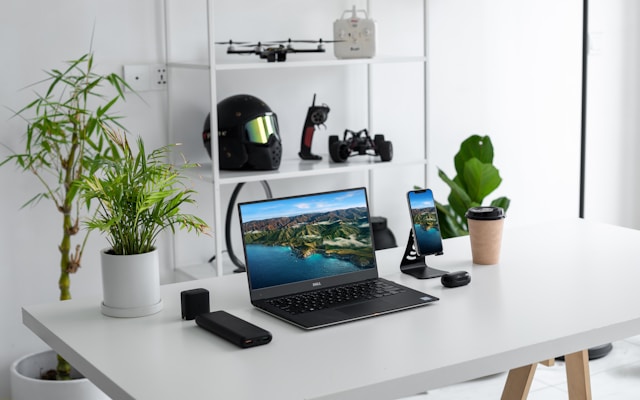5 Game-Changing Gadgets That Feel Like They’re From the Future

Current technology, like advanced trucks, brain chips, foldable displays, and Altos Labs, is changing the world at a fast pace. These new machines are becoming more intelligent and fashionable, easily fitting into our lives. They indicate a future in which humans and technology are more connected than ever.
Tesla Cybertruck: A Futuristic Powerhouse on Wheels
The Tesla Cybertruck isn't merely a stylish vehicle, it's Tesla Cybertruck isn't merely a stylish vehicle; it's rethinking what we expect from cars in the 21st century. The cyberpunk-inspired, angular design is unlike any other vehicle. The durable 30X cold-rolled stainless steel outer casing is also rust-resistant, dent-resistant, and resistant to damage. Tesla was able to make a truck combining pickup capabilities and sports car performance. The highest Cybertruck model featuring three motors drives all wheels and has the capability of accelerating from 0-60 mph in less than 2.9 seconds.
The vehicle has a range of more than 500 miles per charge, making it one of the best electric vehicles for range. The air suspension system by Tesla on the Cybertruck adjusts to varying loads automatically and changes height in accordance. It is perfect for off-road use as well as urban driving. The 65-foot cargo bed, or "vault," is lockable and covered, providing secure, weather-proof storage.
With a ramp and 100 cubic feet of room, it's perfect for tools, equipment, or sporting goods. Inside, it has a 17-inch touchscreen, seats six, and Tesla's Autopilot system is geared toward full self-driving. What sets the Cybertruck apart is that it fearlessly embraces the future. It's more than transportation; it prompts conversations, symbolizes change, and envisions a gas and oil-free future. Love it or not, the Tesla Cybertruck defies design norms, challenging our perception of modern car aesthetics.
Apple Vision Pro: An Augmented Reality Gateway
One of the best new products from Apple that stunningly showcases cutting-edge technology is the Apple Vision Pro. The Vision Pro is a "spatial computer" powered by AR and VR, with eyes, hands, and voice-controlling capability. No keyboards or controllers are needed—this device is designed to bridge the digital and physical worlds. With more than 23 million pixels in each eye, Vision Pro boasts two of the highest 4K screens on the market. The outcome is a viewing experience sharper than anything else on the market for consumers.
The Vision Pro intensifies realism in a wide range of experiences, such as 3D films, virtual workplaces, and video calls with virtual characters. Apple's M2 and R1 chips provide seamless performance, real-time environment viewing, and immediate interaction. VisionOS is a brand-new system that is included with Vision Pro. It enables popular Apple applications such as Photos, Messages, and Safari to look and function in three dimensions.
You can have a lot of virtual windows surrounding you and still be aware of what is going on around you. Apple's EyeSight technology allows others nearby to see your digital eyes, so the experience is friendlier and more social. Vision Pro provides more than just entertainment with spatial audio, gesture recognition, and high-end sensors, which offer multiple functionalities. It is about revolutionizing the way we work from home, learn, engage in health technology, and make things. Apple created a headset that improves your experience without cutting you off from the world around you. Vision Pro is not simply a headset; it's a peek at what the future of technology holds. A space where your digital life isn't merely on a screen, but is everywhere around you.
Neuralink Brain Chip: Easily Linking the Human Mind with the Machine
Neuralink, which is led by Elon Musk, is looking to establish a direct link between our brains and computers. There is a high-tech brain chip at its center. It reads brain signals and translates them into digital commands to link the brain with machines. While it seems like science fiction, Neuralink has indeed made big strides. A computer cursor can be controlled by a paralyzed individual using nothing but their mind with a device implanted within. A small implant referred to as the Neuralink chip is inserted into the head. It contains thin strands, thinner than human hair, which are inserted into the brain to observe how it functions.
These threads record spikes in electrical impulses of nerve cells so that a computer can translate them to perform actions. The chip is easier to use and safer as it talks to devices without the need for cables. At the time of implantation, a trained robot puts in threads gently, steering clear of blood vessels and inflicting the smallest possible bodily damage. In the future, the rapid method will come as an outpatient procedure. Individuals with Parkinson's disease, ALS, spinal cord injuries, and other brain illnesses can be helped by this method. Musk's group is expected to enhance memory, give voice to the disabled, recover vision, and ultimately merge AI and human brains.
There are numerous opportunities, but also plenty of significant ethical issues to take into consideration. Neuralink links technology with living organisms, which is an enormous advance. In the event of increasing automation and AI, success would redefine humanity and rewrite the use of machines. It is not a small bit of technology, it can potentially revolutionize the way we perceive and comprehend the world.
Foldable and Rollable Displays: Displays in a New Shape
The way we utilize gadgets is transforming because of the increasing demand for rollable and foldable screens. They are fashionable, slim, and flexible. The material and OLED technology of the screens make them foldable, bendable, and rollable without compromising quality. Shape-shifting smart devices are being created by market leaders, such as Samsung, LG, and Motorola. Between a smartphone and a tablet, a combination of both, foldable phones give consumers the best of all worlds.
When not being used, rollable TVs like LG's Signature OLED R are discreetly rolled up in their base. This appears trendy and minimizes space. Flexible screens have real-world benefits as well as their trendy look. Experts can do numerous tasks using an instrument tool, such as a laptop with a flexible screen or a tablet/phone device. Creatives are helped by bigger screens because they get more space in which to draw, edit, and preview work on the go. The car world is looking at dashboard screens that can be customized to fit the driver's needs and preferences. The equipment is advanced and costly, but growing durability and aesthetic appeal are making it more practical.
Creating crease-less materials, enhancing hinge quality, and preserving durability are areas of concern. Technology that is tailored to our needs rather than us adapting to it is a welcome concept. Roll-out and foldable screens offer us a new, convenient, and versatile way to access technology. Machines will quickly be able to adjust to our demands down the line, providing the most innovative devices that are space-saving and look like something in the future.
Altos Labs: Rewriting the Biology of Aging
Altos Labs aims to do what appeared impossible earlier: reverse the aging process in our cells. This biotech company, supported by tech moguls Bezos and Milner, intends to fight aging with cutting-edge science. Cellular reprogramming at its core rejuvenates cells by stimulating genes to promote their youthfulness and functionality. The process revolves around Yamanaka factors, found by Nobel winner Shinya Yamanaka, controlling gene activities.
When activated, these genes can revert adult cells into a younger, stem cell-like state. Rewriting cells completely might obliterate their identity, which is not what is wanted when it comes to treatment. Altos Labs focuses on partial reprogramming to revive cells safely, providing potentially better aging therapies. Altos Labs is different from other companies because it works like a scientific laboratory rather than a conventional business. Esteemed scholars' top experts are employed to work on key breakthroughs without the burdens of short-term finances. Applications could include repairing damaged organs and inhibiting age-related diseases such as Alzheimer's or heart disease.
Altos has the goal of defeating aging, the basis of most chronic illnesses, rather than treating symptoms. Even though the technology is not complete yet, its possibilities are amazing. Altos Labs is where innovative thinking on how to make people healthier and live longer converges. If successful, it could revolutionize aging by making people feel more vital and youthful inside their bodies, not just living longer.
Conclusion
Technology is evolving rapidly, and something we have watched in science fiction is now becoming real. Neuralink's brain device, Apple's Vision Pro, and Tesla's Cybertruck are all a big change in machine use. Tomorrow's technology with foldable display screens and Altos Labs holds out the prospect of greater flexibility and complete integration.
In the face of ethical, durability, and safety issues, the desire for better lives, more sophisticated tools, and limitless possibilities drives innovation. Not only do these new technologies facilitate, but they also transform what we can do. We do not sit around waiting for the future anymore; rather, it is here and is transforming everything in its path.








